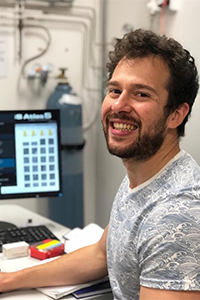Ketogenic diet promotes resistance to psychosocial stress by changing brain lipids and improving microglial health
Everyone experiences stress, but we are not all effected by stress in the same way. Psychological stress is the main risk factor for many mood disorders, including depression, which is the leading cause of global disability. This is why understanding how our brain changes in response to stress and the biological basis of stress resilience (i.e., our capacity to resist the negative effects of stress or the ability to recover from stressful situations in a positive way) is highly relevant for current biomedical research.
 Scientists, including PhD candidate Fernando González Ibáñez (pictured; Tremblay Lab), have started paying attention to how different lifestyle choices can affect how we experience stress. In a new preclinical study published this past September in Brain Behavior and Immunity, first-author Fernando and his co-authors focused on how certain dietary habits can influence our susceptibility or resistance to stress, as well as on the underlying mechanisms of stress resilience.
Scientists, including PhD candidate Fernando González Ibáñez (pictured; Tremblay Lab), have started paying attention to how different lifestyle choices can affect how we experience stress. In a new preclinical study published this past September in Brain Behavior and Immunity, first-author Fernando and his co-authors focused on how certain dietary habits can influence our susceptibility or resistance to stress, as well as on the underlying mechanisms of stress resilience.
They focused on the ketogenic diet, a low-carb and high-fat diet, with a proper amount of protein. In contrast to a normal diet, which is rich in carbohydrates, the main source of energy in the ketogenic diet are lipids (specifically, ketone bodies). The ketogenic diet has already been proven to have clinical relevance in the treatment of epilepsy and certain types of cancer. Interestingly, there have also been various reports indicating that people who follow a ketogenic diet have improved mood, including reduced anxiety. Not a lot is known about how the ketogenic diet causes these beneficial outcomes, but recent research suggests the diet has anti-inflammatory properties. This suggestion is what led the Tremblay Lab to focus this study on microglia, the brain’s resident immune cells. Microglia are required for proper brain function and are the main orchestrators of inflammatory processes in the brain, which have been shown to react to dietary changes and to be involved in stress-related brain changes.
To understand the interaction of stress and diet in the brain, Fernando and his co-authors compared subjects on a normal diet to those on a ketogenic diet. They also studied the differences between those susceptible to stress and those resistant to the same stressor. The team observed that more subjects in the group following a ketogenic diet were categorized as resistant, suggesting that the ketogenic diet made that group more resistant to stress.
They then ventured to understand what potential brain changes could be involved in mediating the increase in stress resistance when following a ketogenic diet. For this, the team looked at microglia in the hippocampus, a brain region known to be involved in stress response and to be affected in those experiencing high levels of stress and depression. They found changes in microglia morphology associated with the effect of the ketogenic diet in non-stressed control subjects.
Fernando used his expertise in state-of-the-art electron microscopy analysis to perform a detailed characterization of microglia, their interactions with synapses, and the health status of their organelles at nanoscale. He found that the microglia of subjects on a ketogenic diet had less organelles presenting signs of cellular stress, indicating that the microglia were overall healthier. He also found that the microglia of subjects susceptible to stress made less direct contact with synaptic elements. As the constant contact between these cells and synapses underly some of their key roles in the brain, a reduction in these contacts suggests that stress can compromise the normal function of microglia.
To finish their study and provide additional molecular insights into the outcomes of the ketogenic diet, the Tremblay Lab worked with the UVic Genome BC Proteomics Centre. They also collaborated with world proteomics expert Maciej Lalowski of the HiLIFE institute at the University of Helsinki, who guided Tremblay Lab members Torin Halvorson and Micaël Carrier in performing a lipidomic analysis (i.e., a study of the lipids that conform the brain). Their analysis of the hippocampus showed that lipid metabolism varies in response to the ketogenic diet and stress. Among the lipids that were significantly enriched, they identified an upregulation of sphingomyelins across non-stressed control and stress-susceptible subjects. These results are strikingly similar to the known effects of classical antidepressants (i.e., serotonin-reuptake inhibitors), which were shown to induce sphingomyelin accumulation in hippocampal neurons. Sphingomyelin is known to be involved in the formation of new neurons through neurogenesis.
Overall, this study stands out for its amazing electron microscopy, detailed ultrastructural analysis and interesting lipidomic approach. It provides novel insights into the beneficial outcomes of the ketogenic diet on the brain, particularly microglial health, and stress resilience.
This study counted on the participation of many Tremblay Lab members, including first-author Fernando González Ibáñez, a PhD candidate from Laval University and a visiting researcher at UVic; Micaël Carrier, a PhD candidate from Laval University; and Dr. Katherine Picard, who recently obtained her PhD from Laval University under the supervision of Dr. Marie-Ève Tremblay and is currently a research assistant at the Tremblay Lab. Torin Halvorson and Chloe G. McKee, who are respectively pursuing their MD/PhD at UBC and Masters in Public Health at the University of Toronto, and Dr. Jessica Deslauriers, an Assistant Professor in the Faculty of Pharmacy at Laval University, also contributed to the paper.
